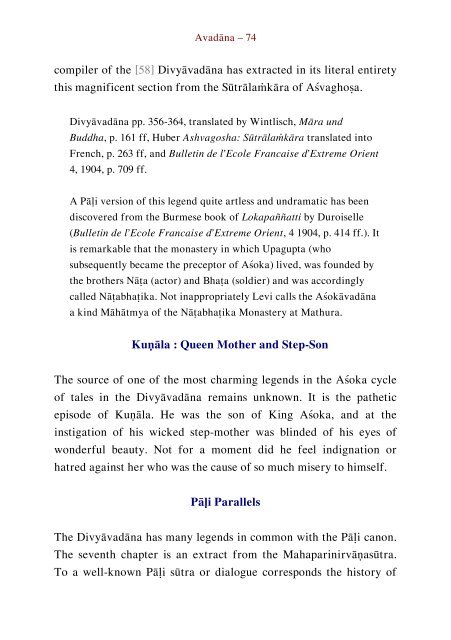Literary History of Sanskrit Buddhism
A study by J. K. Nariman of Sanskrit Buddhism from the Early Buddhist Tradition up to the Mahayana texts proper.
A study by J. K. Nariman of Sanskrit Buddhism from the Early Buddhist Tradition up to the Mahayana texts proper.
Create successful ePaper yourself
Turn your PDF publications into a flip-book with our unique Google optimized e-Paper software.
Avadāna – 74<br />
compiler <strong>of</strong> the [58] Divyāvadāna has extracted in its literal entirety<br />
this magnificent section from the Sūtrālaṁkāra <strong>of</strong> Aśvaghoṣa.<br />
Divyāvadāna pp. 356-364, translated by Wintlisch, Māra und<br />
Buddha, p. 161 ff, Huber Ashvagosha: Sūtrālaṁkāra translated into<br />
French, p. 263 ff, and Bulletin de l’Ecole Francaise d’Extreme Orient<br />
4, 1904, p. 709 ff.<br />
A Pāḷi version <strong>of</strong> this legend quite artless and undramatic has been<br />
discovered from the Burmese book <strong>of</strong> Lokapaññatti by Duroiselle<br />
(Bulletin de l’Ecole Francaise d’Extreme Orient, 4 1904, p. 414 ff.). It<br />
is remarkable that the monastery in which Upagupta (who<br />
subsequently became the preceptor <strong>of</strong> Aśoka) lived, was founded by<br />
the brothers Nāṭa (actor) and Bhaṭa (soldier) and was accordingly<br />
called Nāṭabhaṭika. Not inappropriately Levi calls the Aśokāvadāna<br />
a kind Māhātmya <strong>of</strong> the Nāṭabhaṭika Monastery at Mathura.<br />
Kuṇāla : Queen Mother and Step-Son<br />
The source <strong>of</strong> one <strong>of</strong> the most charming legends in the Aśoka cycle<br />
<strong>of</strong> tales in the Divyāvadāna remains unknown. It is the pathetic<br />
episode <strong>of</strong> Kuṇāla. He was the son <strong>of</strong> King Aśoka, and at the<br />
instigation <strong>of</strong> his wicked step-mother was blinded <strong>of</strong> his eyes <strong>of</strong><br />
wonderful beauty. Not for a moment did he feel indignation or<br />
hatred against her who was the cause <strong>of</strong> so much misery to himself.<br />
Pāḷi Parallels<br />
The Divyāvadāna has many legends in common with the Pāḷi canon.<br />
The seventh chapter is an extract from the Mahaparinirvāṇasūtra.<br />
To a well-known Pāḷi sūtra or dialogue corresponds the history <strong>of</strong>


















